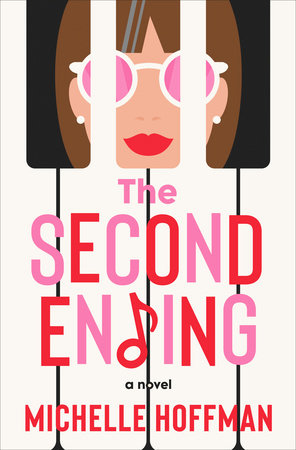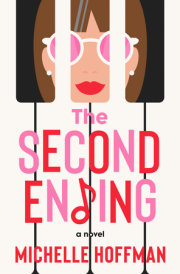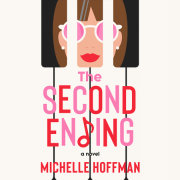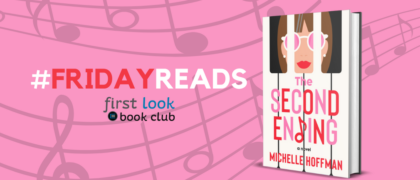CHAPTER ONE Prelude in E Minor
There were no more children at home. No more overflowing laundry hampers. No more backpacks in the foyer. It was just the two of them. Three if you included Mrs. Wintour, which Prudence did.
A week ago, Prudence and Stuart had dropped their youngest child off at a prestigious Midwest college with a clock tower, granite buildings, and stone statues. Their eldest was already attending a prestigious East Coast college with its own clock tower, granite buildings, and stone statues. Now that they were back home in the Southwest, back in the desert, Prudence wept at tiny boxes of raisins in the grocery store, reached for old bath toys in the closet. Catching a whiff of baby lotion was like being tugged into a time machine.
The absence of her daughters unmoored her. She had not expected how much she would miss those beautiful creatures who could delight her one minute and aggrieve her the next.
A child’s world, Prudence had discovered when her girls were young, is only as large as what is around them. Her daughters never cared about their mother’s storied childhood, how she’d played for two sitting presidents and had tea with Isaac Stern. They cared only that she could make mud pies and killer vegan tacos. Prudence gave her children everything she herself had been denied. She read them stories, taught them card games, and held them when they were sad. She nurtured them precisely so they would become independent adults. But the opposite had happened to Prudence along the way: She had grown dependent on them.
Prudence had tried to be brave the day she and Stuart dropped Becca off at college, but as she looked around at the cinderblock dorm room, a terrible thought occurred to her. She would never see Becca again.
“You okay, Mom?”
“Promise me you’ll come back for Christmas and summer breaks?”
“Only if you don’t turn my bedroom into a sewing room. Oh, wait, you already have one!” She hugged her mother. “Of course, I’ll come back home.”
Out in the hallway, Prudence could hear new roommates chattering while moms and dads lugged boxes and suitcases up the stairwells. The cheerful chaos depressed her almost as much as the worn linoleum floors. How can they all be so happy? She had to stop herself from popping her head out the door and yelling, “Which one of you has an extra Xanax?”
In an effort to delay the inevitable, Prudence began taking the clothes from Becca’s bags and arranging them in the wardrobe.
“Mom, I want to do it myself.”
“Just let me . . .”
Stuart placed a soft hand on his wife’s shoulder. “It’s time, Prudence. We have a flight to catch.”
She squeezed Becca’s shoulders. “If you cry, I’ll cry,” her daughter said.
Prudence wanted to do more than cry. She wanted to let out a guttural wail that would echo down the concrete hallway.
Instead, she said, “Don’t forget me!”
To which Becca replied, “That would be hard to do, Mom.”
Now, because she did not have to prepare dinner or run anyone to ballet lessons, Prudence lay listlessly in her chaise by the pool, where she indulged her new obsession with death.
The morbid thoughts had come without warning. She couldn’t talk herself out of them. It was like falling in love suddenly and with the wrong person. It became a sickness. A fever. An illness with no known cure. She would die. Her memorial would attract gawkers. It wouldn’t rain like it does in the movies. It’d be ridiculously hot. People would wear shorts and flip-flops. They’d bring their stupid water bottles and take pictures on their phones. They’d snap up those cheap plastic dolls on eBay first chance they got. Prudence at the Piano, they were called. Her grandmother had arranged for them, like that awkward Dick Cavett interview when she was eight—he’d asked what her favorite song was and she had replied, “Boogie Fever.” Everyone laughed, of course, because he meant, what was her favorite song to play. Prudence would be remembered for that interview, which had racked up nearly three million views on YouTube.
“I’m going to die having been merely a circus act,” she said to Mrs. Wintour. The eight-pound shih tzu cocked her head, and Prudence nodded the way you do when you’re in the company of someone who just gets you. She stared out into the cinnamon-colored desert at the cholla and the brittlebush. It had been a rainless summer. The hot wind blew, the mesquite trees rattled, the yard was kindling. It just needed a spark.
It was six when the glass door slid open.
“There you are,” Stuart said.
“Here I am,” she said.
“Good day?” he asked.
“A day,” she replied. “How are the banks?”
“Still up and running. Look, you’re burning.”
Prudence let out a long breath. “Je vais mourir.” For Prudence spoke three languages, often lapsing into French when she was being dramatic.
“What?”
“I’m going to die.”
“How?”
“I don’t know yet.”
“Ah.”
“What a pity.” She shook her head. “C’est dommage.”
Stuart unclipped his cuff links. “We’re all going to die, you know.”
“Doesn’t that bother you?”
He shrugged, surveying his desert kingdom. He liked coming home to its marble floors and travertine walls. The mahogany-paneled billiard room gave him a thrill he found hard to name. The spectacular cactus garden, visible through floor-to-ceiling windows, was soothing after a long day of asset-backed securities. Then there was the pool, surrounded by teak sectionals and glass tabletops, ceramic pots cascading with succulents. It was a grand residence, and it was their home—a home made possible by the extraordinary success of one little jingle that Prudence had composed at the age of eighteen. And that was Pep Soda, on the air for thirty-one years. Kids turned it into a game in the schoolyard. Fraternity brothers sang it when they got drunk. Gardeners whistled it while trimming hedges. It was very catchy.
“You’re obsessing,” he told her.
Prudence did what she usually did in situations like this. She blamed her parents. “It’s all that LSD my mom took back in the sixties. I’m damaged.”
Prudence’s parents had been hippies. They’d had long hair and listened to folk music and had not worn shoes.
“Yes, that’s true. It was true last week, too, but you weren’t baking in the sun talking about death then.” Stuart stripped off his suit and jumped into the pool in his plain white briefs. He came up for air and said, “You know what I think?”
“Tell me.”
“I think you’re having a midlife crisis.”
“Really?”
“Mm-hmm.”
“I should buy a sports car then.”
“You already have a Porsche,” Stuart said. “A red one, even.”
But a flashy car did not take away the acute realization that in exactly one year and two months, Prudence would be fifty. She was old, her children were gone. So were family dinners around the table, vacations to the lake, and endless trips to the grocery store. That wonderful day-to-dayness that gave Prudence purpose had pried her loose from the clutches of fame. Yet despite this sublime domesticity, she feared that her life would come to an end without accomplishing the one thing that eluded her.
Copyright © 2023 by Michelle Hoffman. All rights reserved. No part of this excerpt may be reproduced or reprinted without permission in writing from the publisher.






